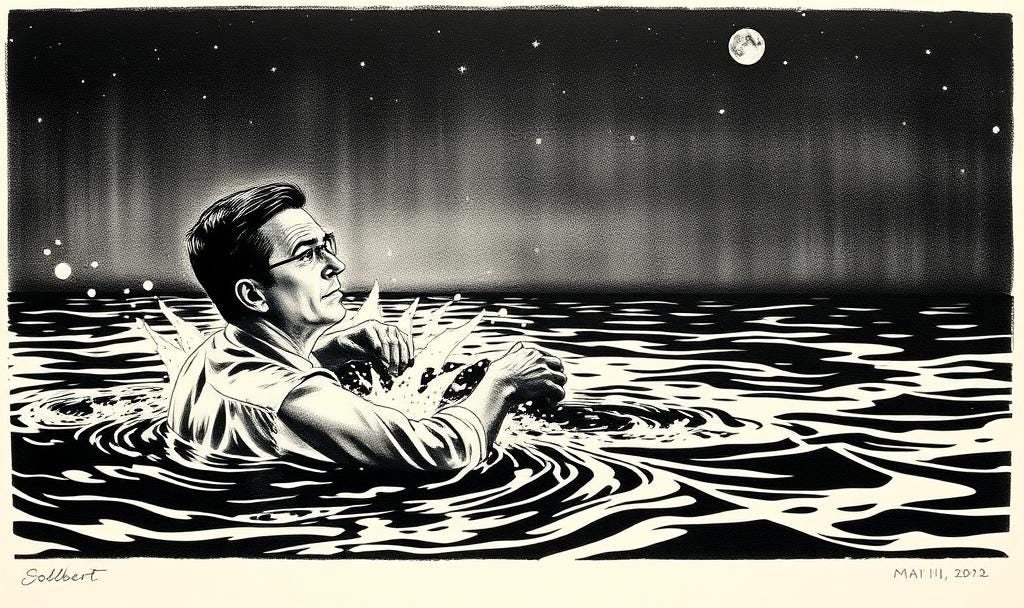Colbert Is Out. Gutfeld Is In. The Late-Night Realignment Is Ruthless.
CBS' cancellation of The Late Show With Stephen Colbert reveals what’s really collapsing: the old model of political comedy.
The economics of attention have changed. The old consensus comedy—polished, expensive, and time-slotted—no longer holds. In its place is a tribal scramble for narrative dominance across platforms and ideologies.
Stephen Colbert was a casualty of this shift not because he leaned too far left, but because he cost too much and moved too slowly. The math no longer worked: rising costs couldn’t be justified in a collapsing ad market and a culture that now favors edge over polish. It wasn’t a political assassination, as some prominent Democrats have speculated. It was financial euthanasia.
Across the board, legacy network late-night show hosts—Fallon, Kimmel, Meyers—are relics of a time when cultural authority came bundled with a broadcast license. They are probably the last of an era that dates back to Steve Allen and Jack Paar. Today, politics-as-entertainment thrives elsewhere: on YouTube, on Fox News, in strangely-named podcasts where senators and comedians swap war stories. The new landscape is fragmented, faster, and cheaper. Audiences don’t want pre-chewed satire or bipartisan talking points. They want blood, jokes, and insider gossip served raw.
Consider the outliers. Fox News’ late-night competitor Gutfeld! routinely beats the networks in viewership, despite airing on cable and employing far, far fewer people than Colbert’s reported 150-200. Audiences all over the spectrum increasingly want the stripped down, raw likes of Joe Rogan, Club Shay Shay, The Breakfast Club, Call Her Daddy, Flagrant, The Shawn Ryan Show, and Tucker Carlson. Donald Trump may have tilted the last election cycle not by appearing on CBS’ 60 Minutes, but by skipping it—choosing to do 60-minute-long podcasts instead.
Politics is hotter—and more entertaining—than ever.
Ruthless—a five-year-old podcast hosted by four Republican political insiders (Josh Holmes, Michael Duncan, John Ashbrook, and Shashank Tripathi) mixing campaign gossip, golf-ready quarter-zips, and mockery of progressive overreach—is now part of the Fox News portfolio. It’s fast, cheap, fun-natured, and influential. David Ellison’s Skydance (soon to own CBS) circling former Wall Street Journal and New York Times writer and editor Bari Weiss’ The Free Press shows that even traditional news producers want a stake in politically-adjacent media—ideologically messy, but narratively potent.
How long before a network makes a play for All-In, a similarly aged podcast born of COVID-19 and hosted by four Silicon Valley insiders (Chamath Palihapitiya, Jason Calacanis, David Sacks, and David Friedberg) (note that Sacks currently serves as the AI and crypto “czar” for the Trump administration)? Their interesting and influential conversations veer from markets to politics to poker to tequila. Maybe an All-In spinoff replaces some of CNBC’s tired after-work programming, in the spirit of Fox Business’ show Happy Hour from the 2000s—buoyantly filmed at the Bull and Bear bar inside the Waldorf Astoria. Maybe a spinoff like Ruthless After Hours slides in after Gutfeld! on FNC. Maybe Bari Weiss takes over Face the Nation—rebranded, naturally, as The Free Press.
We don’t know the answers to these questions, but what is clear is that the winners in this new alignment are what we might call hybrid operators—insiders with outsider energy. People who know how the system works but talk like they’re not part of it. They’re not cleanly partisan, but they’re not neutral either. They’re fluent in conflict, comedy, and real-time relevance. They blend access with attitude. And they know that in today’s media-political economy, you don’t need to be right—you need to be compelling. (Tucker Carlson might be the honorary chairman of this club.)
The losers in this shift? Anything too safe, too scripted, or too slow. Legacy hosts and legacy formats. Comedians who sound like press secretaries. Pundits who stopped surprising ten years ago.
Say what you want about cranky ol’ Bill Maher—Real Time still draws serious viewers for HBO (so does John Oliver, in his own very effective political-comedy way), and Maher’s unique pod Club Random had hosted everyone from Sean Penn to David Mamet to Charlie Kirk to Billy Joel to RFK Jr. And people have kept coming back for more since his show Politically Incorrect launched over 30 years ago. And, perhaps improbably, SNL is still influencing politics after 50 years on the air.
This is a battle over who shapes meaning, who gets heard, and who still thinks they’re programming for America’s living room in 1965. Just as the world order is realigning before our eyes, so too is the news media and entertainment that maps it. Late-night network TV used to broadcast the voice of establishment power. Now the conversation’s happening somewhere else. The action has moved off-airwaves, off-schedule, and off-script.
Reports of late-night politics’ death have been exaggerated. It’s just evolving: mutated and multiplatform.



